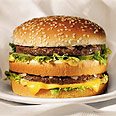
Kosher cheeseburgers and the Temple
Jews in Israel must abandon preoccupation with non-issues - like kosher cheeseburgers - and focus on the big questions that form the foundation of a Jewish society in the Land of Israel
A student of mine recently sent me a link to a passionate discussion about the propriety of eating kosher cheeseburgers. The arguments proffered centered around:
- Whether religious Jews should eat anything that looks non-kosher
- Whether the desire for kosher cheeseburgers indicated a character or spiritual flaw
- Whether one should eat in a restaurant at all
- Whether one should stick to eating “Jewish food”
I was intrigued by the discussion because it sounded quite familiar. With the exchange of just a few words, it could have been the recreation of the Pesah (Passover) kitniyot debate (which peaked last year after the Bet Din of Machon Shilo ruled that all Jews may eat kitnyot on Pesah.)
On a gastronomic level, the key question is “What is Jewish food?” It is my humble opinion—and that of the Torah and our Sages—that Jewish food is simply food that is kosher. It doesn’t matter whether it looks like Italian spaghetti, Japanese sushi or Yemenite pita bread—which is a close relative of the original matzoth. The only requirement to be Jewish is that it complies with Jewish dietary laws.
On a spiritual level, I find that there is something inherently misguided in the belief that shtetl food is Jewish food, and that it is somehow superior for sustaining our Jewish souls. This outlook seems to indicate a longing for life in the Pale of Settlement. But was that life so wonderful? The shtetl was a terrible place; it was a divine punishment that should not be fondly remembered. It was a life of abject poverty for most, of filth, and of marauding Cossacks. It was a place where our European forefathers did not eat schmaltz on bread because it improved them spiritually, but because they simply couldn’t afford a chicken.
Worrying about the propriety of eating kosher cheeseburgers is no different than worrying about eating kitniyot on Pesah. It’s a little thing that saps our energy and our vitality; it prevents meaningful debate and discussion about the much more serious issues.
Misplaced Longing
The time has come for us to put aside our longing for life in the Exile and devote ourselves to the gift that HaShem has given us; we don’t want to sound like our less-than-grateful forebears in the Wilderness who cried over the “good old days” in Egypt where they ate fish, cucumbers, and garlic (the herring and dill pickles of yore).
The Jewish commentators, Yonathan Ben Uziel and Rashi, write that the time of the Jewish return to the Land of Israel will mark a flowering of Torah. The Radak (Rav David Kimhi) even says that the learning of this time will be an “innovation”.
It is ironic that for some the thought of “innovation” is akin to heresy. Coming from a school of Exilic Torah, they have been conditioned and taught to view change, any change, as impossible—in contravention to the words of our Sages. This school renders itself incapable of providing the intellectual and spiritual leadership necessary for the flowering and growth of Jewish life in Erets Yisrael today, whether it’s about kosher cheeseburgers, techelet (blue) fringes on our tzitzith or rebuilding the Temple.
The reality of Torah in time and place
Rav Yirmiyah, was born in Bavel (Babylon) and came to Erets Yisrael as a young man. As such, he was uniquely qualified to discriminate between the Torah of Bavel and that of Erets Yisrael. And indeed he took the Rabbis of his old country to task for their outlook.
The Babylonian Talmud records that he once remarked: "Those foolish Babylonians! It is because they dwell in a land of darkness that they make such dark (incorrect) statements!" Rashi explains this by adding: "When they do not know the true explanation for something, they come up with incorrect explanations".
Rav Zera, the teacher of Rav Yirmiyah, shared his view. The Talmud records that when he moved to Erets Yisrael from Bavel, he fasted 100 fasts in order to forget his learning from Bavel (Bava Mezia 85a). All of the above contrasts with the comments of our Sages who wrote "There is no Torah like the Torah of Erets Yisrael, and no wisdom like the wisdom of Erets Yisrael" (Bereshith Raba 16,4).
But how does this affect or apply to us?
We must follow the advice of Rav Zera and Rav Yirmiyah and look beyond the darkness of Exile. We must abandon our preoccupation with non-issues—the kitniyot and the kosher cheeseburgers—and open our minds and hearts to a truer appreciation of the wordings and intent of the Torah as we focus on the big
questions that form the foundation of a Jewish society in the Land of Israel:
- Whether religious Jews should actively seek the reinstitution of the pre-Exilic customs of the Land of Israel
- Whether the lack of desire for the Temple indicates a character or spiritual flaw
- Whether synagogues should still be saying the prayer for the spiritual centers and Torah academies of Babylon
- How we can re-establish institutions such as the Sanhedrin and the Temple in order to “renew our days as of yore”.
Rav David Bar-Hayim is the Head of Machon Shilo and conducts research in the Jerusalem Talmud. A longer version of this article can be found at www.machonshilo.org










